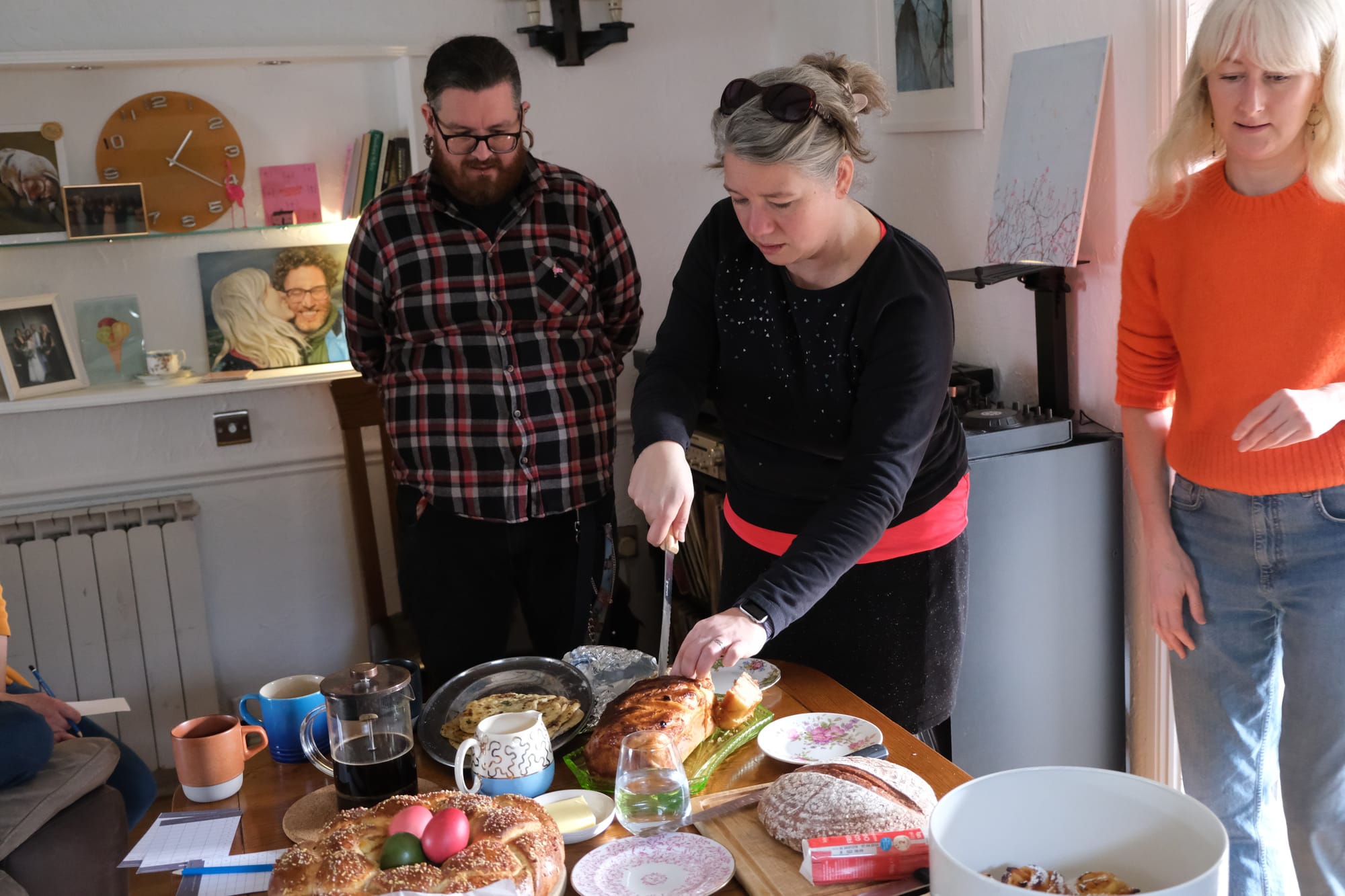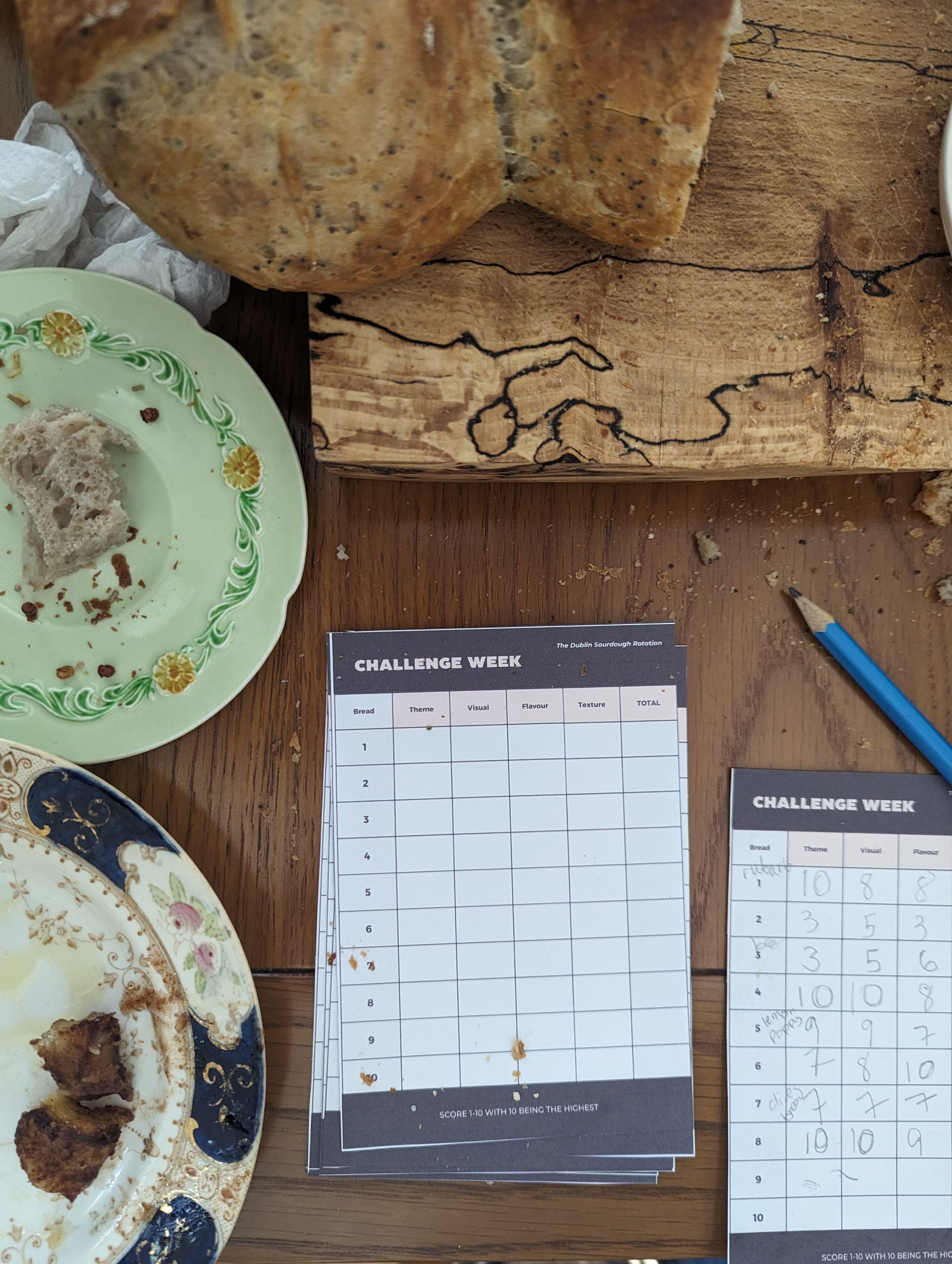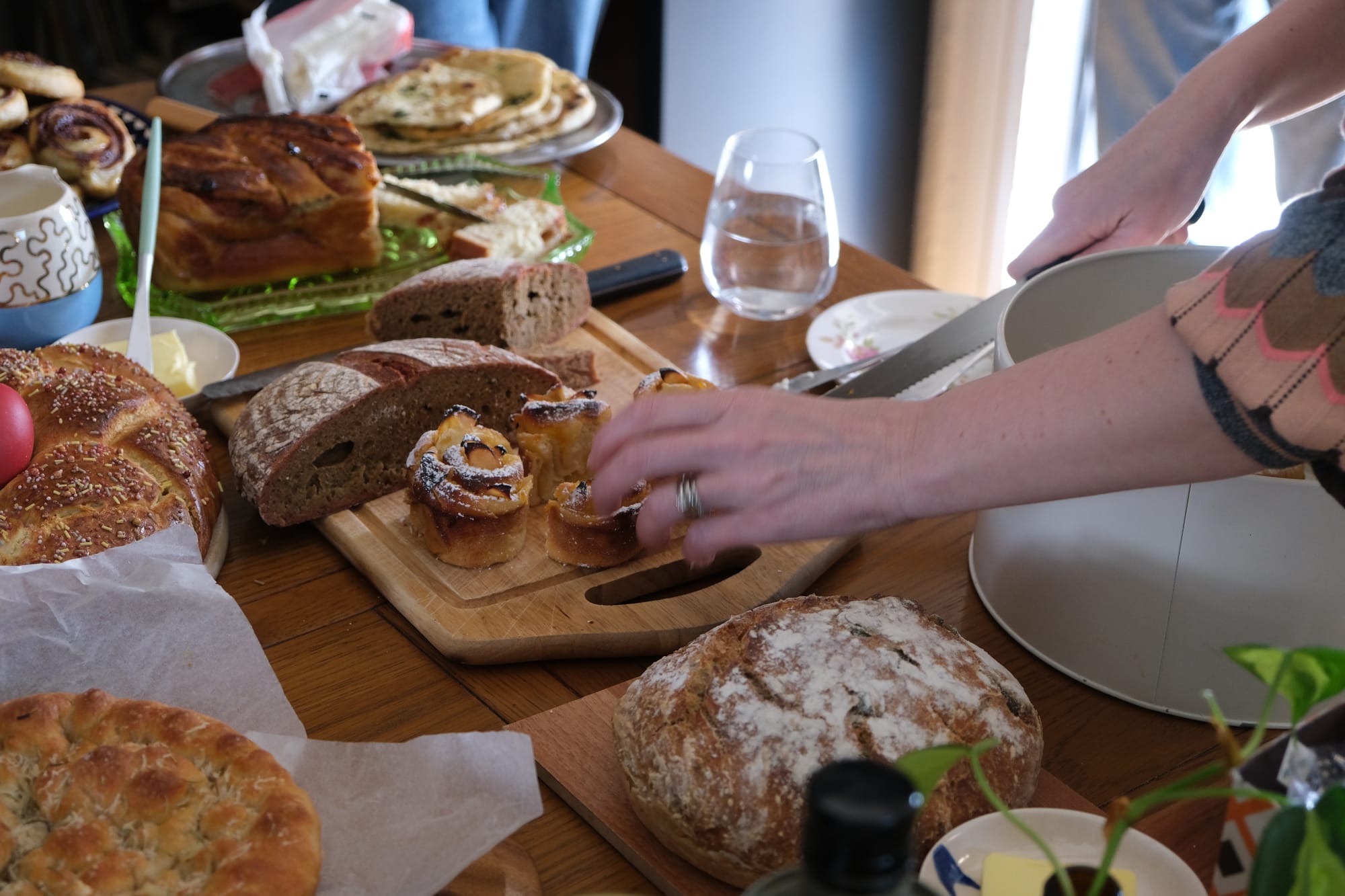What’s the best way to tell area residents about plans for a new asylum shelter nearby?
The government should tell communities directly about plans for new asylum shelters, some activists and politicians say.
The Sourdough Rotation group was initiated by Niamh Lacy, as a community that goes beyond baking tips.

On Saturday 2 March, Sarah Lovely’s dining room smelt of bread and her doorbell rang and rang.
Ding-dong.
“I’ll get it,” says Derek Kenny.
He comes back with Judy Cecil and her daughter. “Sorry, it was the final episode of a series we were watching.”
“Would you like some coffee, tea … ? Water?” says Lovely, the host.
“Tea and … tea. Two cups of tea, please,” says Cecil.
“How are you?” Niamh Lacy asks Cecil, as she helps her find the right plate for her babka.
“Oh, wow, who did that?” says Cecil, looking at a braided bread. “What’s the name of it?”
Ding-dong.
Almost everyone was late for this weekend’s meet-up in Cabra of the Sourdough Rotation group. But nobody really cared.
The group, now a year old, brings together a bunch of sourdough enthusiasts who exchange loaves, recipes, tips, foraging spots, starter – live-fermented culture – and unite every now and then to chat and taste their creations.
They also run, as on this Saturday, a regular challenge to push their baking to the next level.
“The concept it’s about food sharing,” says Niamh Lacy, founder of the group.
The idea came partly from her master’s, where she focused on sustainable behaviours and circular economy. “I wasn’t a sourdough baker back then,” she says.
“I didn’t know how it was going to turn out,” she said. But she put up posters in coffee shops and health food stores around the area and hoped for the best.

In March 2023, the Sourdough Rotation began as a four-person group. Today it has 33 members, across five postal districts. The largest group being in Dublin 7.
Living near each other is key to its success. The further people have to walk to deliver or pick up bread, the more complicated it is to coordinate.
It’s been through tweaks, but these days, activities go like this: a rotation lasts one month. Participants bake two loaves every two weeks, one for themselves and one for a rotating partner.
On the weeks they don’t bake for others, others bake for them. So that in one rotation, you bake twice, you get bread twice and you get to meet two other people.
Every 10 weeks or so come the “challenges” when the group comes together to share and rate what they’ve baked .
Ahead of the March challenge, the WhatsApp group pinged with messages.
“Final proofing mine now.”
“Short of proofing time here too.”
Lovely’s door is unlocked. But everyone is so focused on their bake or making it to the reunion, that nobody reads that message. Ding-dong!
Her long dining room table is set with grabbings of cups and mugs and glasses, plates, cutting boards, and bread knives.
The club didn’t start out with challenge meet-ups. They invented them later for bakers eager to grow their skills.
That’s why Conn Walsh joined the group, he said later in an interview. He had baked sourdough during pandemic lockdowns but wanted to upskill. “So I thought this is a great way to do that and also, you get free bread!”
Challenges come with two conditions. The goods have to be made with sourdough. And, they have to follow a theme.
This month, its “flavours of spring”.
At the challenges, they all try one person’s baked goods, then score them – and move on to the next, says Lacy.
“At the end, we just say who the top score is,” she says. Losers keep their dignity.
They’re scored on meeting the theme, look, taste, and texture.


Kenny is up first with herby flatbreads. “Vegan wild garlic and chives that were found in Phoenix Park this morning,” he says.
Cecil’s entry is a rhubarb and strawberry babka. Her mum would always make strawberry rhubarb pie, she says.
“And we always knew spring was there,” says Cecil, picking up a nearby bread knife and starting to slice.
There’s a lull as the judges chew and fill out their scorecards.
Lacy presents a dense-looking loaf, with rye and spelt, pepper and thyme. A second shot, after a beetroot fiasco, she says.
There are apple and apricot roses, made with slices of apple glued together with custard and brioche strips. Jennifer O’Brien says it’s only her second time doing them.
The room is appreciative. “How did you make them?” “Can I ask for the recipe?” O’Brien promises to share.

The tasting session turns to a braided brioche wreath filled with apricots, lemon zest and white chocolate, with coloured boiled eggs in the middle.
In Austria, brioche is a very springtime Easter bread, says Maria Pertl, and you always would eat it with jam.
“My granny would have a slice of brioche with apricot jam, so my baking is inspired by her,” said Pertl.
Some Rotationers already have their pet microorganisms when they join the group, named and all. Others need a glob to get going.
Alexandra Sofroni tried to start hers from scratch, she says. But after no signs of life, she borrowed some from Lacy.
Sofroni presents a rosemary-and-olives loaf. “This is my second time [baking],” she says.
Like Sofroni, Anusha Gorur Chandrashekar and Thawab Shibly are new members finding their feet in their baking.
“So this is Lemon-orange cinnamon buns and they are intentionally flat, you know?
For better baking …” Shibly says.
After a pause, Shibly says: “They are supposed to be fluffy, I don’t know what happened.”
“I added the orange later on the dough. I wonder if that made any difference,” she says.
“What if (next time) you put the orange zest with the cinnamon?” someone asks.
The votes are in. Pertl is declared as this month’s winner. She blushes but, smiling, accepts her prize – a pot of spring bulbs and lavender soap.
Lovely calls the Rotation a “lovely ritual”. Her husband nods in support.
It’s not just about freshly baked bread, they say, but getting to know your neighbours, she says.
“It’s really inspiring to see all those different flavours and different approaches,” she says, after the meet up.
The goal of the Sourdough Rotation is to build that sharing muscle, Lacy says. “As it is how communities are formed, through kindness and sharing and helping each other.”
The competition is over, but the table is still full. They normally all pick bits to take home, she says.
The bakers fill their bags, tins and tupperwares with personal favourites, leaving just a trace of crumbs.
Get our latest headlines in one of them, and recommendations for things to do in Dublin in the other.